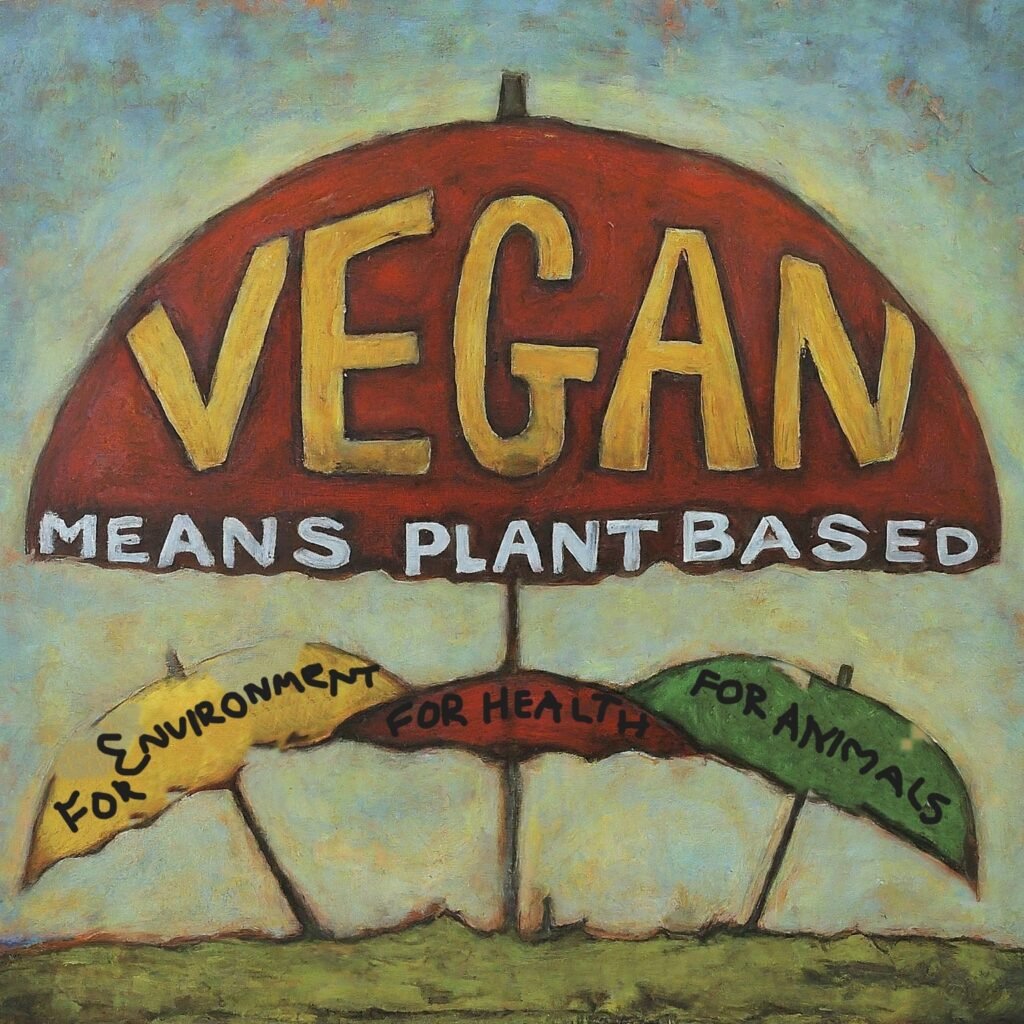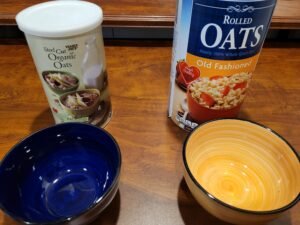Vegan? Plant-Based? What’s the difference?
At its core, veganism is the practice of abstaining from animal products. The term ‘vegan’ is not limited to food choices, it is an umbrella term.
Veganism is also a philosophy that rejects animal exploitation in all forms, extending beyond food choices to avoid animal products in clothing, cosmetics, and entertainment industries.
The Plant-Based Eating A Guide
The world of plant-based eating can seem complicated at first glance. This blog post will serve as your guide, unpacking the definitions, exploring the reasons people choose these lifestyles, and highlighting the health benefits (which will be our main focus).
Veganism as An Ethical and Philosophical Stand; Environment and/or Animal Welfare
Veganism can go beyond just dietary choices. For some it’s an ethical philosophy that rejects all animal exploitation and animal industries that are believed to have unethical practices and to compromise the environment. Ethical vegans might avoid all animal products, including meat, dairy, eggs, and even honey. While the diet may be plant-based, it is not necessarily healthy. The core reasons for adopting an ethical vegan lifestyle often stem from a desire to reduce animal suffering and promote environmental sustainability. The lifestyle choices often extend to avoiding animal-derived clothing (leather, wool) and cosmetics (that contain animal ingredients or are tested on animals) as well as animal exploitation in the entertainment industry.
Environment: Animal agriculture has a significant environmental impact. A vegan lifestyle can help reduce greenhouse gas emissions and water usage. A report from Bloomberg states the livestock industry in the US uses 41% of the land in the US. Plant-based diets can help reduce greenhouse gas emissions and resource consumption.
Animal Welfare: Many people are drawn to veganism or plant-based eating out of a concern for animal welfare and a desire to reduce animal suffering. They object to unethical factory farming practices. Some people believe it’s wrong to kill animals for food when there are viable plant-based alternatives.

Understanding Vegan, Plant-Based, and Whole-Food Plant-Based Diets
The world of food choices can be confusing, with terms like vegan, plant-based, and whole-food plant-based getting thrown around. While they share some similarities, there are key distinctions between them. This blog post will break down these terms, explore the reasons people choose them, and delve into the health benefits associated with a plant-based lifestyle.
Plant-Based (not necessarily healthy): While plant-based diets are thought to be a healthy choice, less nutritious highly processed plant-based foods are often included in a vegan or plant based diet. This broader category includes added sugars, refined oils, and highly processed foods. Just because a food is vegan or plant-based does not mean it is healthy. This broad term includes any kind of plant-based based diet healthy or not so beneficial.
Plant-Based with Whole Foods, a Healthier Diet: This category includes whole grains, fruits, vegetables, legumes, nuts, and seeds. Healthy fats from these whole food sources are encouraged. There is a range of strictness according to individual choice in this category. Most will continue to use refined oils and may include plant-based processed foods, A Whole Foods Plant Based diet likely includes a broad array of restaurant dining as well. This approach offers flexibility and is generally considered very sustainable in the long term. Some meat-eaters might describe their diet as “plant-based” if they prioritize vegetables and whole grains but still consume meat occasionally.”Flexitarian” is a more suitable term for someone who primarily eats plant-based but occasionally incorporates meat.
Whole Food Plant-Based (WFPB), a much Healthier Diet: Studies suggest that whole food, plant-based diets can be effective in weight management, lower the risk of heart disease, type 2 diabetes, and certain cancers, and also address many other symptoms and conditions. Whole-food plant-based (WFPB) emphasizes unprocessed or minimally processed plant-based foods. Most will continue to use refined oils and some may include plant-based processed foods, in moderation, once nutritional needs are met. Think fruits and vegetables in their natural state, whole grains like brown rice and quinoa, and beans and lentils. A plant-based diet, emphasizing the importance of whole foods for optimal nutrient intake along with an optimal fiber to calorie ratio. Dining at restaurants becomes a bit more of a challenge, but entirely doable.
Whole-Food Plant-Based No Oil (WFPBNO) An Even Healthier Approach: Whole Food Plant-Based No Oil (WFPBNO) takes the principles of WFPB a step further by eliminating all refined oils from the diet. This means avoiding common cooking oils like olive oil, coconut oil, and avocado oil. Proponents of WFPBNO believe that eliminating all refined oils can further reduce your intake of saturated fat and calories, leading to additional health benefits. The focus is on getting fats from whole food sources like nuts, seeds, avocados, and olives. Cooking methods like steaming, baking, roasting, and using water or vegetable broth to saute are emphasized. Proponents of WFPB believe it is the healthiest way to eat. This diet becomes more challenging socially as most restaurants and most food is prepared with refined sugars and or oils.
Whole Food Plant-Based No Oil (WFPBNO, Restricted Fats): Short Term Approach for Reversing Disease Whole Food Plant-Based No Oil (WFPBNO, Restricted Fats) builds on the principles of WFPBNO eating by eliminating all added refined oils AND takes it a step further, limiting even naturally occurring hig-fat whole foods like nuts, seeds, and avocados. Perhaps a tablespoon of ground flax seed per day would be included for Omega-3 fatty acids. There is a growing trend for Doctors to recommend a short-term ‘Jumpstart’ WFPBNO, Restricted Fats diet to address lifestyle related diabetes and heart disease. This can significantly improve blood work results within weeks. While there is still a small amount of fat included. It’s important to note that WFPBNO, Restricted Fat diets may not be suitable for everyone. It’s best implemented under the guidance of a medical professional for a set period of time. They can help create a personalized plan that ensures you’re getting all the essential nutrients your body needs. The most challenging aspect of this diet is relearning cooking habits and the social aspect of making such a different choice than most of society.
Finding the Right Plant-Based Choice
There’s no single definition of “plant-based” that fits everyone. The key is to find a dietary approach that aligns with your health goals, values, and preferences. Consulting a registered dietitian can ensure you’re getting the nutrients your body needs, especially if you’re following a more restrictive plant-based diet. An important thing to know is that on any Plant-Based diet and even some non Plant-Based diets is vitamin B12 supplements are necessary.
Focus on Health and Well Being: This Blog’s Core
This blog will primarily focus on the health aspects of plant-based living. We’ll explore the scientific evidence behind the benefits mentioned above and delve into how a WFPB diet can contribute to overall well-being.
Remember, this is just a starting point. As you explore this topic further, you’ll find a wealth of information and resources to guide you on your plant-based journey, whether you’re dipping your toes in or diving headfirst.
Additional Resources
The Physicians Committee for Responsible Medicine: https://www.pcrm.org/
Forks Over Knives: https://www.forksoverknives.com
NutritionFacts.org | The Latest Nutrition Related Topics
T. Colin Campbell Center for Nutrition Studies | Plant Nutrition




